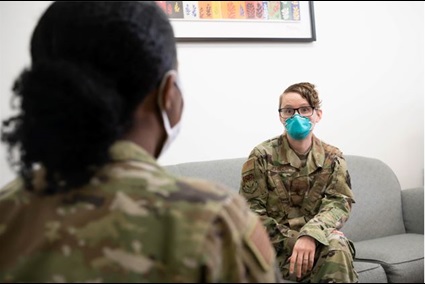By Olivia Bentley, Ph.D., LPCC
Nov. 18, 2021
 U.S. Air Force photo by Heather Heiney
U.S. Air Force photo by Heather Heiney
Clinicians should utilize all helpful strategies at their disposal in order to assist service members at risk for suicide. Dialectical Behavior Therapy (DBT) is one approach to help service members keep themselves safe when they experience suicidal ideation. DBT is recommended in the VA/DOD Clinical Practice Guideline for the Assessment and Management of Patients at Risk for Suicide as an evidence-based treatment for those with suicidal thoughts, attempts, and self-harm behaviors. DBT is a multifaceted approach that includes aspects of Cognitive Behavioral Therapy and teaches skills to address emotion regulation, distress tolerance, and interpersonal effectiveness.1
Since it was first presented in 1993 by Marsha Lineham2 as a treatment for individuals with borderline personality disorder, DBT was adapted for use with additional populations, including service members who are at risk for suicide. DBT teaches effective and accessible strategies for managing emotions and reducing risky behaviors. Once learned, many strategies can be easily practiced by service members.
Providers who are interested in adding to their clinical toolbox to help address suicide risk may seek training in DBT. The training, as well as the treatment regimen, can be time-consuming. Mindfulness is one strategy taught within DBT that is widely accepted by both providers and clients, and can be easily incorporated into clinical work.1 The use of individual interventions outside of the full DBT framework is not necessarily evidence-based and may have limited effectiveness. However, mindfulness-based interventions show promise and have documented benefits to those with suicidal ideation, including veterans.3,4,5
Mindfulness
Mindfulness skills are foundational within DBT and facilitate increased awareness of thoughts and emotions.4 It is a form of meditation that is taught within DBT to help service members focus on the present, avoiding rumination of the past or worrying too much about the future.
In the context of suicide risk care, mindfulness can help service members observe their present suicidal thoughts and accompanying emotions without judgment. With guilt and shame so often accompanying and worsening suicidal ideation, the skill allows them to think and feel without further burdening themselves.
Mindfulness is not a practice easily reinforced in our fast-paced, multi-tasking world, and specifically in the daily lives of service members. Many beginners report difficulty remaining focused or getting easily distracted during their meditation practice. Because it may feel foreign at first, basic mindfulness skills should be taught and practiced in session. You can teach basic skills such as the one described below, and once mastered, progress to more advanced skills. Below are some instructions for a basic mindfulness exercise.
Beginner Mindfulness Practice
Instruct the service member to assume a comfortable seated position and take some slow and deep breaths. Have them choose an item object to focus their attention on (You may choose to have some specific items in your office for this purpose. If so, offer these to the service member to choose). Instruct them that as they complete this exercise, it is likely that their attention may wander, and encourage them that, as this happens, they are simply to bring their attention back to the object they are observing.
Instruct them to observe the object and note anything they observe about the item: the color(s), shape, angles, texture, and anything else about the object that makes it unique. You should ask them prompting questions about these and other aspects as a way to guide them through this exercise at first. They should silently note these and continue to do so for a period of time agreed upon by the two of you at the beginning of the exercise (around 5 minutes at first).
When first teaching this skill, be sure to instruct in session and then send the service member home with printed instructions to practice on their own. Try practicing this skill in session until the service member feels they have learned it well enough to use on their own when experiencing suicidal thoughts or feeling overwhelmed. They can use mindfulness to observe their suicidal thoughts without judgment and without acting on them. This strategy can help them to get through moments of heightened risk and set the stage for the use of additional coping skills when in crisis.
For more information:
For additional reading on the utility of DBT for treatment of suicide risk in service members, please review the VA/DOD Clinical Practice Guideline for the Assessment and Management of Patients at Risk for Suicide.
References:
-
The Assessment and Management of Suicide Risk Work Group. (2019). VA/DOD clinical practice guideline for the assessment and management of patients at risk for suicide. Washington, DC: Department of Veterans Affairs and Department of Defense. https://www.healthquality.va.gov/guidelines/mh/srb/
-
Lineham, M. (2015). DBT skills training manual (2nd ed.). New York, NY: The Guilford Press.
-
Barnhofer, T., Crane, C., Brennan, K., Duggan, D. S., Crane, R. S., Eames, C., Radford, S., Silverton, S., Fennell, M. J. V., & Williams, J. M. G. (2015). Mindfulness-based cognitive therapy (MBCT) reduces the association between depressive symptoms and suicidal cognitions in patients with a history of suicidal depression. Journal of Consulting and Clinical Psychology, 83(6), 1013–1020.
-
Interian, A., Chesin, M.S., Stanley, B., Latorre, M., St. Hill, L.M., Miller, R.B., King, A.R., Boschulte, D.R., Rodriguez, K.M., & Kline, A. (2021). Mindfulness-based cognitive therapy for preventing suicide in military veterans: A randomized clinical trial. The Journal of Consulting and Clinical Psychology, 83(6), 1939-2117.
-
Kline, A., Chesin, M., Latorre, M., Miller, R., St. Hill, L., Shcherbakov, A., King, A., Stanley, B., Weiner, M.D., & Interian, A. (2016). Rationale and study design of a trial of mindfulness-based cognitive therapy for preventing suicidal behavior (MBCT-S) in military veterans. Contemporary Clinical Trials, 50, 245-252.
Dr. Bentley is a licensed professional clinical counselor and contracted subject matter expert at the Psychological Health Center of Excellence. She has worked with individuals experiencing chronic suicidality and has facilitated dialectical behavior therapy groups for women in residential treatment.